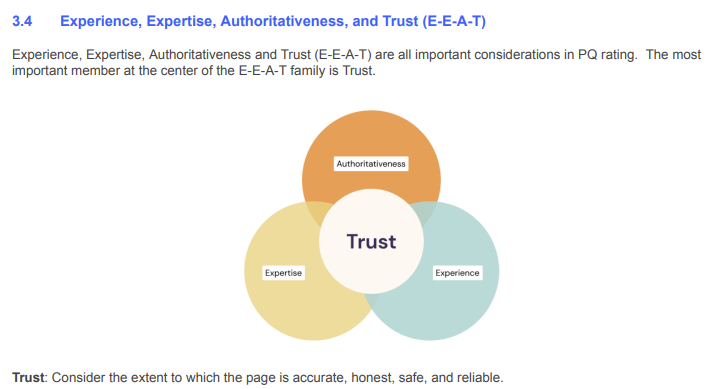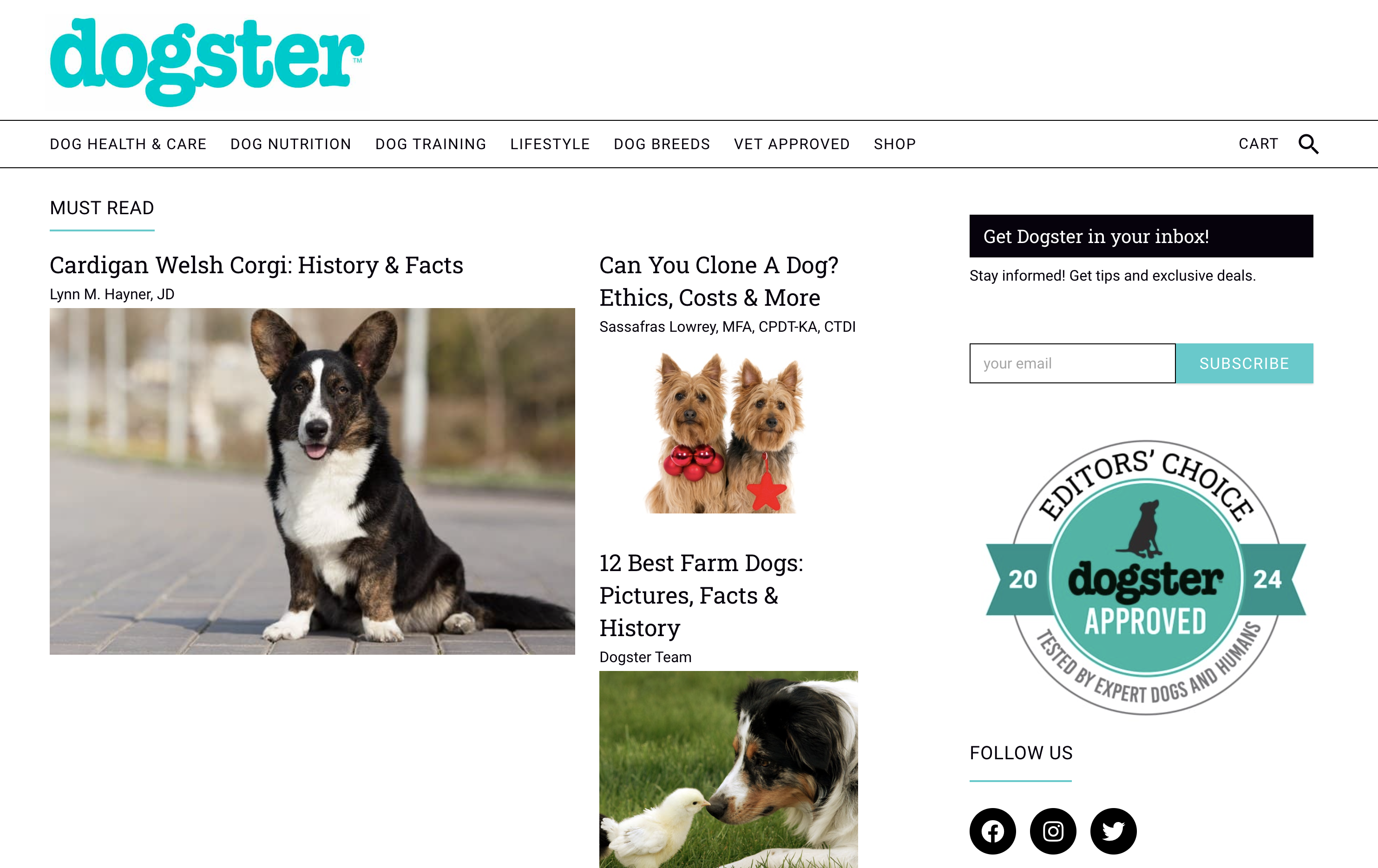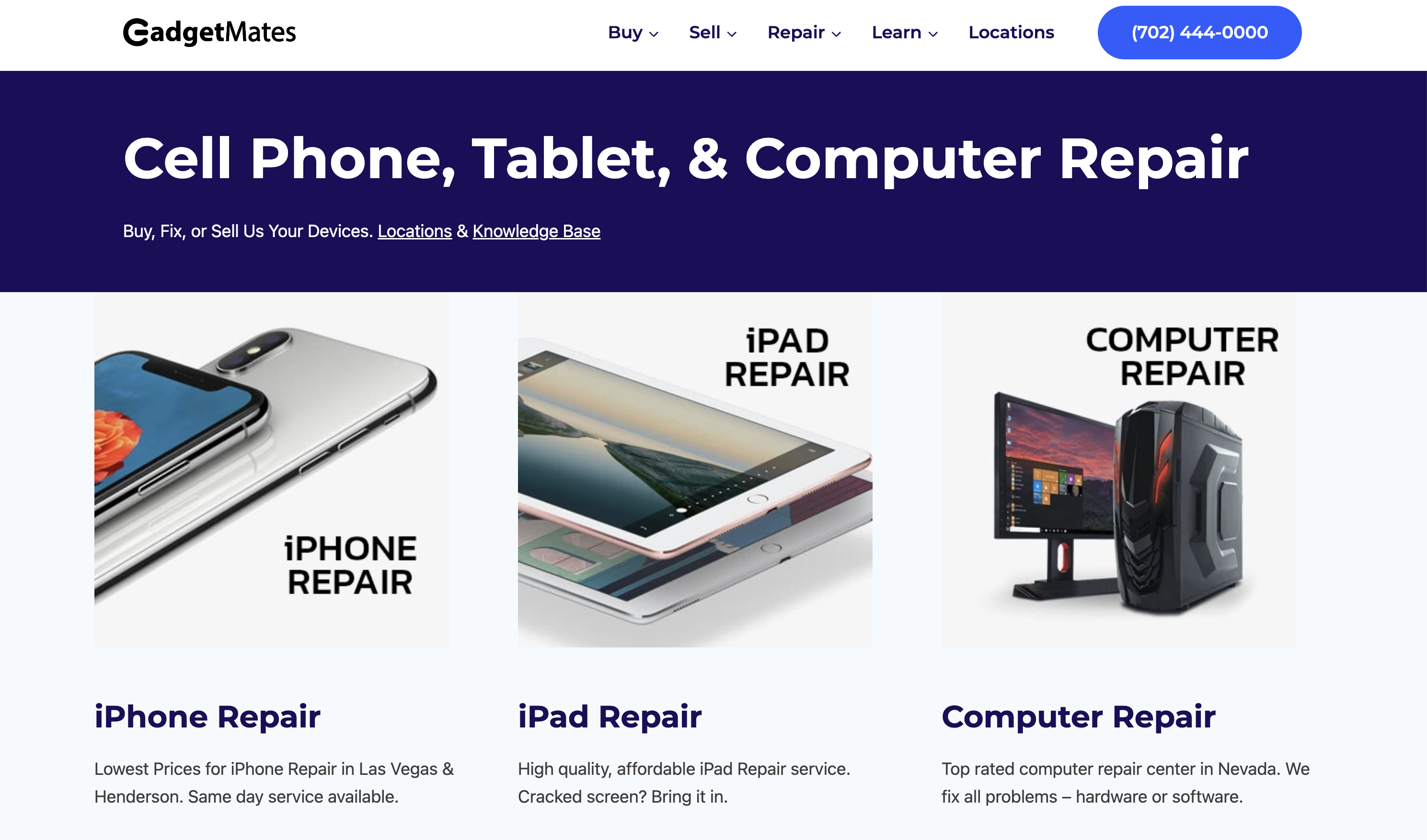E-A-T (Expertise, Authoritativeness, Trustworthiness) has been a cornerstone of Google’s Search Quality Rater Guidelines for years. Recently, Google added a new “E” to the mix – Experience.
Understanding and optimizing for E-E-A-T strongly correlates with SEO success.
In this article, you’ll learn what the E-E-A-T criteria mean, why Google values first-hand experience, and, most importantly, how to demonstrate E-E-A-T for your brand and content.
Drawing from Google’s Search Quality Rater Guidelines, this piece will equip you with actionable insights to boost your E-E-A-T signals.
You’ll also find real-world examples of websites that exemplify E-E-A-T principles across different niches. And with the rise of AI-generated content, we’ll discuss how to navigate E-E-A-T in the age of ChatGPT and other AI tools.
What Is E-E-A-T?
The acronym “E-E-A-T” stands for Experience, Expertise, Authoritativeness, and Trustworthiness.
E-E-A-T is an evolution of the original E-A-T concept.
Google introduced E-A-T, which stands for Expertise, Authoritativeness, and Trustworthiness, to evaluate web content’s overall quality and credibility. It became a key component of Google’s Search Quality Rater Guidelines, which human raters use to assess search results.
The addition of the second “E” for “Experience” is a more recent evolution.
Google recognized that first-hand experience is critical to expertise and credibility for many topics.
This is especially true for “Your Money or Your Life” (YMYL) topics, where the content can impact a person’s health, financial stability, safety, or well-being.
By expanding to E-E-A-T, Google is signaling that it values the content creator’s credentials, reputation, and direct, real-world experience with the topic.
It’s important to note that E-E-A-T is not a direct ranking factor in Google’s search algorithm. Instead, it is a guideline used by human quality raters to evaluate the overall quality of search results.
However, Google uses the data from these evaluations to improve its algorithms. So, while E-E-A-T is not a direct ranking signal, optimizing for it can indirectly improve a site’s search performance over time.
Why E-E-A-T Is Important
By prioritizing E-E-A-T, Google aims to surface the most reliable, trustworthy, and valuable content for any query.
This benefits users by providing them with higher-quality search results. It also benefits brands and content creators who invest in building genuine expertise and authority in their field.
E-E-A-T is particularly critical for YMYL brands and topics. For these sensitive subjects, users need to be able to trust the information they find. Content created by those with direct experience is often seen as more trustworthy and reliable.
However, the importance of E-E-A-T extends beyond just YMYL pages. Users value content from those with first-hand knowledge and experience for virtually any topic. This could apply to product reviews, travel guides, technical tutorials, etc.
For example, if an author is writing an iPhone review, they should have used the product – or if they are writing about the best restaurants in San Francisco, they should have visited them.
Google’s updated Search Quality Rater Guidelines say this about experience:
“Consider the extent to which the content creator has the necessary first-hand or life experience for the topic. Many types of pages are trustworthy and achieve their purpose well when created by people with a wealth of experience.
For example, which would you trust: a product review from someone who has personally used the product or a “review” by someone who has not?”
In addition to adding experience as a factor, Google is placing renewed emphasis on trust.
See the diagram below for how trust is placed in the center of Experience, Expertise, and Authoritativeness.
 Image from Google, June 2023
Image from Google, June 2023Trust is the most critical component of E-E-A-T, Google says, “Because untrustworthy pages have low E-E-A-T no matter how Experienced, Expert, or Authoritative they may seem.”
Experience, expertise, and authoritativeness support a quality rater’s trust assessment.
If you’re following Google’s guidance regarding E-E-A-T up to this point, you’re well on your way to building the level of trust Google’s quality raters seek.
Here’s how to ensure you maintain that trust by demonstrating first-hand experience.
[Recommended Read] → Ranking Factors: Systems, Signals, and Page Experience
How to Demonstrate E-E-A-T For Your Brand
To demonstrate a high level of E-E-A-T, brands and content creators should focus on each of the four components:
- Experience: Show that your content is created by people with direct, first-hand experience with the topic. This could be through author bios, “behind the scenes” content, or by directly referencing personal experiences within the content itself.
- Expertise: Demonstrate your subject matter expertise through the depth and accuracy of your content and author credentials and by citing reputable sources and studies.
- Authoritativeness: Build your brand’s authority by consistently publishing high-quality content, earning coverage and mentions from other respected sites, and growing your reputation within your industry.
- Trustworthiness: Be transparent about who is behind your content, provide clear contact and customer service information, maintain a positive reputation, and follow ethical content practices.
How Google’s Quality Raters Evaluate E-E-A-T
Google’s Search Quality Rater Guidelines have multiple chapters evaluating E-E-A-T, from a high to a low level.
Chapter 4.5.2: Lowest E-E-A-T
Chapter 4.5.2 of Google’s Search Quality Rater Guidelines states:
“If the E-E-A-T of a page is low enough, people cannot or should not use the MC of the page. If a page on YMYL topics is highly inexpert, it should be considered Untrustworthy and rated Lowest. Use the Lowest rating if the website and content creator have an extremely negative reputation, to the extent that many people would consider the webpage or website untrustworthy.”
Chapter 5.1: Lacking E-E-A-T
Chapter 5.1 of Google’s Search Quality Rater Guidelines has examples of what quality raters are instructed to look for when evaluating a low level of E-E-A-T:
“Low quality pages often lack an appropriate level of E-E-A-T for the topic or purpose of the page. Here are some examples:
- The content creator lacks adequate experience, e.g. a restaurant review written by someone who has never eaten at the restaurant.
- The content creator lacks adequate expertise, e.g. an article about how to skydive written by someone with no expertise in the subject.
- The website or content creator is not an authoritative or trustworthy source for the topic of the page, e.g. tax form downloads provided on a cooking website.
- The page or website is not trustworthy for its purpose, e.g. a shopping page with minimal customer service information.”
Additionally, Google says a positive reputation cannot overcome the lack of E-E-A-T for the topic or purpose of the page.
Chapter 7.3: High Level Of E-E-A-T
Chapter 7.3 of Google’s Search Quality Rater Guidelines has information regarding the criteria for achieving a high level of E-E-A-T.
Regarding demonstrating experience, Google says:
“Pages with High E-E-A-T are trustworthy or very trustworthy. Experience is valuable for almost any topic. Social media posts and forum discussions are often High quality when they involve people sharing their experience. From writing symphonies to reviewing home appliances, first-hand experience can make a social media post or discussion page High quality.”
Chapter 8.3 Very High Level Of E-E-A-T
Chapter 8.3 of Google’s Search Quality Rater Guidelines has information regarding the criteria for achieving the highest level of E-E-A-T:
“Very high E-E-A-T is a distinguishing factor for Highest quality pages. A website or content creator who is the uniquely authoritative, go-to source for a topic has very high E-E-A-T.
A content creator with a wealth of experience may be considered to have very high E-E-A-T for topics where experience is the primary factor in trust.
A very high level of expertise can justify a very high E-E-A-T assessment. Very high E-E-A-T websites and content creators are the most trusted sources on the internet for a particular topic.”
E-E-A-T And AI Generated Content
The rise of advanced AI tools like ChatGPT has raised questions about how AI-generated content aligns with E-E-A-T guidelines.
Since the “E” in E-E-A-T refers to first-hand experience, content created solely by AI may struggle to meet these criteria for specific topics.
Google has advised against publishing AI-generated content without human review and editing. The company clarified that using AI isn’t inherently against guidelines, but the content must be evaluated for accuracy, usefulness, and compliance with other quality guidelines.
Marie Haynes, a respected expert on E-E-A-T and search quality, has been closely following the impact of AI on search. She notes that Google seems increasingly focused on rewarding original, high-quality content while devaluing generic or low-quality AI-generated content.
This aligns with recent developments like Google’s March 2024 Core Update, which resulted in the deindexing of hundreds of websites, many of which were found to contain significant amounts of AI-generated content.
This update and Google’s guidance on evaluating AI content for “originality” suggest that the search engine is actively combating the rise of low-quality, generic AI content that doesn’t meet E-E-A-T standards.
For brands and content creators, the key is to use AI to assist and enhance human-created content, not replace it entirely.
AI can help with research, outlining, and even drafting, but the final content should always be reviewed, edited, and enhanced by a human expert with real-world experience. This approach allows for the efficiency benefits of AI while still maintaining the E-E-A-T qualities Google values.
3 Examples Of Websites Demonstrating E-E-A-T
1. Dogster
 Screenshot from dogster.com, March 2024
Screenshot from dogster.com, March 2024Dogster.com is a strong example of a website that demonstrates the principles of E-E-A-T (Experience, Expertise, Authoritativeness, Trustworthiness) in several ways:
- Experience: Many articles are written by authors with relevant credentials and experience, such as veterinarians, certified dog trainers, and other canine experts. This suggests the content is informed by real-world, first-hand knowledge.
- Expertise: The breadth and depth of topics covered, from dog health and nutrition to breeds and training, indicate a high level of subject matter expertise. The site provides detailed, informative content comprehensively addressing common questions and concerns.
- Authoritativeness: Dogster.com’s reputation as a leading resource for dog owners, its use of expert authors, and its ability to secure interviews with recognized figures in the dog world lend it authority within its niche.
- Trustworthiness: The site provides clear author bylines, links to additional resources, and disclaimers where appropriate. This transparency helps build trust with readers. The fact that veterinarians review content also enhances credibility.
2. GadgetMates
 Screenshot from gadgetmates.com, March 2024
Screenshot from gadgetmates.com, March 2024GadgetMates is an excellent example of a site that demonstrates E-E-A-T for several reasons:
- Experience: GadgetMates is an established electronics repair center with brick-and-mortar locations in Las Vegas and Henderson, Nevada. Its team has firsthand experience repairing devices like iPhones, computers, game consoles, etc.
- Expertise: The site’s extensive knowledge base of articles, guides, and tips showcases in-depth technical knowledge about electronic devices, repairs, and related topics.
- Authoritativeness: As a top-rated, go-to repair shop in its local area with 5-star reviews across platforms like Google and Yelp, GadgetMates has built authority as a leader in its market. Customers widely trust the company for repairs on high-value devices, which speaks to its authoritative standing.
- Trustworthiness: Several site elements point to GadgetMates’ trustworthiness and transparency, such as customer reviews and testimonials, clear contact info and location addresses, an “About Us” page, privacy policy and terms, and warranties. Offering free diagnostics also shows they aren’t just out to make a quick buck.
3. Homesteading Family
 Screenshot from homesteadingfamily.com, March 2024.
Screenshot from homesteadingfamily.com, March 2024.Homesteading Family is another great example of a site that demonstrates E-E-A-T for the following reasons:
- Experience: Josh and Carolyn Thomas, the site’s creators, have firsthand experience living a self-sufficient homesteading lifestyle on their 40-acre property in Idaho. They grow, preserve, and prepare most of their own food for their large family of 11 children, lending credibility to the information they share.
- Expertise: The blog posts, videos, recipes, and classes demonstrate an in-depth knowledge of homesteading skills. The content provides practical, detailed information that reflects the creators’ expertise gained through years of study and practice.
- Authoritativeness: Over time, the site has established authority in the homesteading niche. With an extensive library of in-depth content, an engaged community, appearances on major media outlets, a popular YouTube channel, and a podcast, the brand is well-established as an authoritative resource for this lifestyle. Other websites also frequently link to Homesteading Family articles.
- Trustworthiness: Several factors indicate the site is trustworthy: the creators openly share their identities, photos, and stories; the “about” page provides background info; a clear contact page is provided; the content is high-quality and non-spammy; sources are cited; and a privacy policy and terms are posted. The personal, transparent tone also builds trust with the audience.
E-E-A-T Is A Sustainable, Long-Term Approach To SEO
Google’s evolution of E-A-T to E-E-A-T signifies a growing emphasis on first-hand experience in evaluating content quality. For SEO professionals, this means a renewed focus on creating content that demonstrates genuine expertise, experience, authority, and trust.
Key takeaways:
- E-E-A-T is not a direct ranking factor, but optimizing for it can indirectly boost search performance over time.
- First-hand experience is especially critical for YMYL topics, but it’s valuable for any content niche.
- Demonstrate E-E-A-T through author expertise, citing reputable sources, building brand authority, and maintaining transparency.
- When using AI tools, ensure human experts review and enhance the content to maintain E-E-A-T.
- Studying examples of high E-E-A-T websites can inspire your own content strategy.
By considering these principles and consistently creating content that exudes E-E-A-T, you’ll be well-positioned to earn search visibility and user trust.
As search engines prioritize quality and credibility, investing in E-E-A-T is a sustainable, long-term approach to SEO.
More resources:
- E-E-A-T’s Google Ranking Influence Decoded
- Is E-E-A-T A Ranking Factor?
- The Three Pillars Of SEO: Authority, Relevance, And Experience
- Google Algorithms & Updates Focused On User Experience: A Timeline
- How Search Engines Work
Featured Image: diy13/Shutterstock





